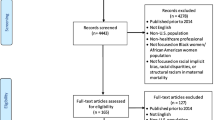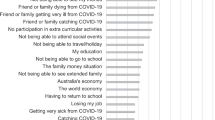Abstract
Obesity stigma has been linked to poor health outcomes on an individual and population basis. However, little research has been conducted on the role of chronic or recent obesity stigma in the health disparities experienced by pregnant women with high body mass index. The purpose of this article is to discuss poor birth outcomes in this population from an integrated perinatal health framework perspective, incorporating obesity stigma as a social determinant. In studies of non-pregnant populations, obesity stigma has been associated with stress, unhealthy coping strategies, psychological disorders, and exacerbations of physical illness. This article examines the mechanisms by which obesity stigma influences health outcomes and suggests how they might apply to selected complications of pregnancy, including macrosomia, preterm birth and cesarean delivery. Given the rates of obesity and associated pregnancy complications in the United States, it is critical to examine the determinants of those problems from a life course and multiple determinants perspective. This paper offers a conceptual framework to guide exploratory research in this area, incorporating the construct of obesity stigma.

Similar content being viewed by others
References
Link, B. G., & Phelan, J. C. (2006). Stigma and its public health implications. Lancet, 367(9509), 528–529. doi:10.1016/s0140-6736(06)68184-1.
Goldberg, D. S. (2012). Social justice, health inequalities and methodological individualism in US health promotion. Public Health Ethics, 5(2), 104–115. doi:10.1093/phe/phs013.
Puhl, R. M., & Heuer, C. A. (2010). Obesity stigma: Important considerations for public health. American Journal of Public Health, 100(6), 1019–1028. doi:10.2105/ajph.2009.159491.
Vartanian, L. R., & Silverstein, K. M. (2013). Obesity as a status cue: Perceived social status and the stereotypes of obese individuals. Journal of Applied Social Psychology, 43, E319–E328. doi:10.1111/jasp.12052.
Flegal, K. M., Carroll, M. D., Kit, B. K., et al. (2012). Prevalence of obesity and trends in the distribution of body mass index among US adults, 1999–2010. Journal of the American Medical Association, 307(5), 491–497. doi:10.1001/jama.2012.39.
Yogev, Y., & Catalano, P. M. (2009). Pregnancy and obesity. Obstetrics and Gynecology Clinics of North America, 36(2), 285. doi:10.1016/j.ogc.2009.03.003.
Misra, D. P., Guyer, B., & Allston, A. (2003). Integrated perinatal health framework—A multiple determinants model with a life span approach. American Journal of Preventive Medicine, 25(1), 65–75. doi:10.1016/s0749-3797(03)00090-4.
Swift, J. A., Hanlon, S., El-Redy, L., et al. (2013). Weight bias among UK trainee dietitians, doctors, nurses and nutritionists. Journal of Human Nutrition & Dietetics, 26(4), 395–402. doi:10.1111/jhn.12019.
Waller, T., Lampman, C., & Lupfer-Johnson, G. (2012). Assessing bias against overweight individuals among nursing and psychology students: An implicit association test. Journal of Clinical Nursing, 21(23–24), 3504–3512. doi:10.1111/j.1365-2702.2012.04226.x.
Pantenburg, B., Sikorski, C., Luppa, M., et al. (2012). Medical students’ attitudes towards overweight and obesity. PLoS ONE, 7(11), e48113. doi:10.1371/journal.pone.0048113.
Buxton, B. K., & Snethen, J. (2013). Obese women’s perceptions and experiences of healthcare and primary care providers: A phenomenological study. Nursing Research, 62(4), 252–259. doi:10.1097/NNR.0b013e318299a6ba.
Mold, F., & Forbes, A. (2013). Patients’ and professionals’ experiences and perspectives of obesity in health-care settings: A synthesis of current research. Health Expectations, 16(2), 119–142. doi:10.1111/j.1369-7625.2011.00699.x.
Lindhardt, C. L., Rubak, S., Mogensen, O., et al. (2013). The experience of pregnant women with a body mass index >30 kg/m(2) of their encounters with healthcare professionals. Acta Obstetricia et Gynecologica Scandinavica, 92(9), 1101–1107. doi:10.1111/aogs.12186.
Mulherin, K., Miller, Y. D., Barlow, F. K., et al. (2013). Weight stigma in maternity care: Women’s experiences and care providers’ attitudes. BMC Pregnancy Childbirth, 13, 13. doi:10.1186/1471-2393-13-19.
Furber, C. M., & McGowan, L. (2011). A qualitative study of the experiences of women who are obese and pregnant in the UK. Midwifery, 27(4), 437–444. doi:10.1016/j.midw.2010.04.001.
Levine, L. D., Landsberger, E. J., Bernstein, P. S., et al. (2013). Is obesity an independent barrier to obtaining prenatal care? American Journal of Perinatology, 30(5), 401–405. doi:10.1055/s-0032-1326984.
Lewis, S., Thomas, S. L., Blood, R. W., et al. (2011). How do obese individuals perceive and respond to the different types of obesity stigma that they encounter in their daily lives? A qualitative study. Social Science and Medicine, 73(9), 1349–1356. doi:10.1016/j.socscimed.2011.08.021.
Brandheim, S., Rantakeisu, U., & Starrin, B. (2013). BMI and psychological distress in 68, 000 Swedish adults: A weak association when controlling for an age-gender combination. BMC Public Health, 13, 68. doi:10.1186/1471-2458-13-68.
Mustillo, S. A., Budd, K., & Hendrix, K. (2013). Obesity, labeling, and psychological distress in late-childhood and adolescent black and white girls: The distal effects of stigma. Social Psychology Quarterly, 76(3), 268–289. doi:10.1177/0190272513495883.
Antin, T. M. J., & Hunt, G. (2013). Embodying both stigma and satisfaction: An interview study of African American women. Critical Public Health, 23(1), 17–31. doi:10.1080/09581596.2011.634784.
Marshall, N. E., & Spong, C. Y. (2012). Obesity, pregnancy complications, and birth outcomes. Seminars in Reproductive Medicine, 30(6), 465–471. doi:10.1055/s-0032-1328874.
Rasmussen, K. M., Abrams, B., Bodnar, L. M., et al. (2010). Recommendations for weight gain during pregnancy in the context of the obesity epidemic. Obstetrics and Gynecology, 116(5), 1191–1195. doi:10.1097/AOG.0b013e3181f60da7.
American College of Obstetricians and Gynecology. (2013). ACOG Committee opinion no. 549: Obesity in pregnancy. Obstetrics and Gynecology, 121(1), 213–217. doi:10.1097/01.AOG.0000425667.10377.60.
Ferraro, Z. M., Barrowman, N., Prud’homme, D., et al. (2012). Excessive gestational weight gain predicts large for gestational age neonates independent of maternal body mass index. The Journal of Maternal-Fetal & Neonatal Medicine, 25(5), 538–542. doi:10.3109/14767058.2011.638953.
Li, S., Rosenberg, L., Palmer, J. R., et al. (2013). Central adiposity and other anthropometric factors in relation to risk of macrosomia in an African American population. Obesity (Silver Spring, Md.), 21(1), 178–184. doi:10.1002/oby.20238.
Retnakaran, R., Ye, C., Hanley, A. J. G., et al. (2012). Effect of maternal weight, adipokines, glucose intolerance and lipids on infant birth weight among women without gestational diabetes mellitus. Canadian Medical Association Journal, 184(12), 1353–1360. doi:10.1503/cmaj.111154.
Ju, H., Chadha, Y., Donovan, T., et al. (2009). Fetal macrosomia and pregnancy outcomes. The Australian & New Zealand Journal of Obstetrics & Gynaecology, 49(5), 504–509. doi:10.1111/j.1479-828X.2009.01052.x.
Goldberg, D. S., & Puhl, R. M. (2013). Obesity stigma: A failed and ethically dubious strategy. Hastings Center Report, 43(3), 5–6. doi:10.1002/hast.167.
Durso, L. E., Latner, J. D., & Hayashi, K. (2012). Perceived discrimination is associated with binge eating in a community sample of non-overweight, overweight, and obese adults. Obesity Facts, 5(6), 869–880. doi:10.1159/000345931.
Durso, L. E., Latner, J. D., White, M. A., et al. (2012). Internalized weight bias in obese patients with binge eating disorder: Associations with eating disturbances and psychological functioning. International Journal of Eating Disorders, 45(3), 423–427. doi:10.1002/eat.20933.
Ornoy, A. (2011). Prenatal origin of obesity and their complications: Gestational diabetes, maternal overweight and the paradoxical effects of fetal growth restriction and macrosomia. Reproductive Toxicology (Elmsford, NY), 32(2), 205–212. doi:10.1016/j.reprotox.2011.05.002.
Dickey, R. P., Xiong, X., Xie, Y. Q., et al. (2013). Effect of maternal height and weight on risk for preterm singleton and twin births resulting from IVF in the United States 2008–2010. American Journal of Obstetrics and Gynecology, 209(4), E1.
Cnattingius, S., Villamor, E., Johansson, S., et al. (2013). Maternal obesity and risk of preterm delivery. Journal of the American Medical Association, 309(22), 2362–2370.
de Jongh, B. E., Paul, D. A., Hoffman, M. et al. (2013). Effects of pre-pregnancy obesity, race/ethnicity and prematurity. Maternal and Child Health Journal. doi:10.1007/s10995-013-1296-8.
Shapiro, G. D., Fraser, W. D., Frasch, M. G., et al. (2013). Psychosocial stress in pregnancy and preterm birth: Associations and mechanisms. Journal of Perinatal Medicine, 41(6), 631–645. doi:10.1515/jpm-2012-0295.
Wee, C. C., Davis, R. B., Huskey, K. W., et al. (2013). Quality of life among obese patients seeking weight loss surgery: The importance of obesity-related social stigma and functional status. Journal of General Internal Medicine, 28(2), 231–238. doi:10.1007/s11606-012-2188-0.
Lillis, J., Levin, M. E., & Hayes, S. C. (2011). Exploring the relationship between body mass index and health-related quality of life: A pilot study of the impact of weight self-stigma and experiential avoidance. Journal of Health Psychology, 16(5), 722–727. doi:10.1177/1359105310388321.
Fettich, K. C., & Chen, E. Y. (2012). Coping with obesity stigma affects depressed mood in African-American and white candidates for bariatric surgery. Obesity, 20(5), 1118–1121. doi:10.1038/oby.2012.12.
Pickering, R. P., Goldstein, R. B., Hasin, D. S., et al. (2011). Temporal relationships between overweight and obesity and DSM-IV substance use, mood, and anxiety disorders: Results from a prospective study, the national epidemiologic survey on alcohol and related conditions. Journal of Clinical Psychiatry, 72(11), 1494–1502. doi:10.4088/JCP.10m06077gry.
Roberts, R. E., & Duong, H. T. (2013). Perceived weight, not obesity, increases risk for major depression among adolescents. Journal of Psychiatric Research, 47(8), 1110–1117. doi:10.1016/j.jpsychires.2013.03.019.
Lu, M., & Halfon, N. (2003). Racial and ethnic disparities in birth outcomes: A life-course perspective. Maternal and Child Health Journal, 7, 13–30.
McEwen, B., & Stellar, E. (1993). Stress and the individual. Mechanisms leading to disease. Archives of Internal Medicine, 153, 2093–2101.
Geronimus, A. T. (1992). The weathering hypothesis and the health of African-American women and infants: Evidence and speculations. Ethnicity and Disease, 2(3), 207–221.
Mason, K. (2012). The unequal weight of discrimination: Gender, body size, and income inequality. Social Problems, 59(3), 411–435. doi:10.1525/sp.2012.59.3.411.
Evans, G. W., & Kim, P. (2010). Multiple risk exposure as a potential explanatory mechanism for the socioeconomic-status-health gradient. Annals of the New York Academy of Sciences, 1186, 174–189.
Chu, S. Y., Kim, S. Y., Schmid, C. H., et al. (2007). Maternal obesity and risk of cesarean delivery: A meta-analysis. Obesity Reviews, 8(5), 385–394.
Fyfe, E. M., Anderson, N. H., North, R. A., et al. (2011). Risk of first-stage and second-stage cesarean delivery by maternal body mass index among nulliparous women in labor at term. Obstetrics and Gynecology, 117(6), 1315–1322. doi:10.1097/AOG.0b013e318217922a.
Wispelwey, B. P., & Sheiner, E. (2013). Cesarean delivery in obese women: A comprehensive review. The Journal of Maternal-Fetal Medicine, 26(6), 547–551. doi:10.3109/14767058.2012.745506.
Bogaerts, A., Witters, I., Van den Bergh, B. R. H., et al. (2013). Obesity in pregnancy: Altered onset and progression of labour. Midwifery, 29(12), 1303–1313. doi:10.1016/j.midw.2012.12.013.
Carlhall, S., Kallen, K., & Blomberg, M. (2013). Maternal body mass index and duration of labor. European Journal of Obstetrics & Gynecology and Reproductive Biology, 171(1), 49–53. doi:10.1016/j.ejogrb.2013.08.021.
Norman, S. M., Tuuli, M. G., Odibo, A. O., et al. (2012). The effects of obesity on the first stage of labor. Obstetrics and Gynecology, 120(1), 130–135. doi:10.1097/AOG.0b013e318259589c.
Spong, C. Y., Berghella, V., & Wenstrom, K. D., et al. (2012). Preventing the first cesarean delivery: Summary of a joint Eunice Kennedy Shriver National Institute of Child Health and Human Development, Society for Maternal-Fetal Medicine, and American College of Obstetricians and Gynecologists Workshop. Obstet. Gynecol. United States, pp 1181–1193.
Abenhaim, H. A., & Benjamin, A. (2011). Higher caesarean section rates in women with higher body mass index: Are we managing labour differently? Journal of Obstetrics and Gynaecology Canada, 33(5), 443–448.
Author information
Authors and Affiliations
Corresponding author
Rights and permissions
About this article
Cite this article
DeJoy, S.B., Bittner, K. Obesity Stigma as a Determinant of Poor Birth Outcomes in Women with High BMI: A Conceptual Framework. Matern Child Health J 19, 693–699 (2015). https://doi.org/10.1007/s10995-014-1577-x
Published:
Issue Date:
DOI: https://doi.org/10.1007/s10995-014-1577-x




